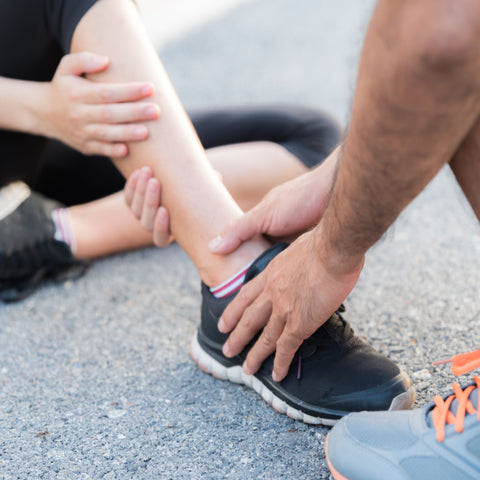It is no secret that athletes and injuries go hand in hand. Even in their fittest forms, runners are vulnerable to tender ruptures, ligament tears, and muscle sprains, taking them off the track. These physical injuries are painful as it is, but they also cast a shadow on the athlete's mental health leading them to injury depression. Besides, there can be several other factors affecting an athlete's mental health.

It became more evident when during Olympics 2020, Simon Bile rescinded from participating in the women's gymnastic team event, prioritising her mental health. Although the onlookers took time to comprehend her struggle, most participants resonated with Simon. This article strives to talk about such causes and methods to cope with them.
What can lead to depression amongst athletes?
Sparking a long-overdue conversation, the 2020 Olympics highlighted the importance of mental health amongst athletes. Athletes and sportspersons often don the role of heroes, role models, and opinion leaders. However, in the end, they are humans and susceptible to trauma, depression, and anxiety. The article shares some reasons that can lead to depression in athletes.

- Injury: Rigorous training schedules, immense physical strength, and expertise become a part of an athlete's individuality. However, injuries are the hard blows taking that identity for a toss. Irrespective of the injury's intensity, in most cases, athletes are taken off the fields and advised to recover before they resume. It is during this phase that injury depression creeps in, impacting the athlete's self-esteem. They often lose their form or prowess, fall back on schedule, and miss opportunities while their peers continue to move ahead.
- Loss of loved ones: Like everyone else, coming to terms with the loss of loved ones can be painstaking, and an athlete can slip into depression at the time. American sprinter Sha'Carri Richardson admitted to smoking legal cannabis while training for the Olympics as she dealt with the loss of her birth mother.
- Performance pressure and failure: Athletes are constantly in the public eye, shouldering the expectation of millions. For instance, during the 2019 cricket World Cup semi-finals when the entire country placed its hopes on the Indian Cricket team, but unfortunately, the team lost to New Zealand. Although wins and losses are a part of the game, incidents like these can influence the athlete's self-esteem leading to depression.
- Pandemic: The Covid-19 pandemic brought the world to a sudden hiatus, and many professionals were affected, including athletes. It was essentially a tough time for them as they could not participate or practice, slowly losing their edge.
- Retirement: Retiring from what you loved to do, especially when you excel at it, can be troublesome. Many athletes struggle with depression as their sports careers near the end.

All these are just the tip of the iceberg. While these are the most common reasons, there can be myriad causes that lead to depression in runners and athletes. This article attempts to throw light on ways in which one can cope with injury and other depression.
How to cope with injury and other depression?
- Seeking help: There are several qualified experts who you can talk to in times of crisis. They are equipped with an in-depth understanding of such situations and can guide you out of your dark spaces. Being self-reliant is golden, but asking for help does not make you weak, especially when you need it the most.
- Remaining active despite injury: Do not shy away from physical activity. Despite losing your edge, stay in touch with exercising under expert guidance. You can also take help from trained physiotherapists who can assist you in getting back in shape and regaining your prowess.
- Rediscovering oneself: While you are away from sports, try to rediscover yourself. You can use this time to explore things you always found interesting but could hardly make time for them.
- Going back to an old hobby: Find your way back to an old hobby like reading, gardening, or playing an instrument. You can also catch up on your favourite TV shows and podcasts.
- Allowing oneself to grieve: Acceptance is the first step to healing, and grieving allows you to come to terms with the situation. Athletes are expected to toughen up and swallow the bitter pills without making a hue and cry. However, bottling up your emotions leaves no room for healing. Recognize and experience the pain, and that will pave the way for positive thoughts.
- Use positive affirmations: Remember all the good times when you were at your best and use them as positive affirmations. You can also remind yourself how amazing and strong you are, always capable of rising above all odds.
- Getting adequate rest: Allow your body to get adequate rest and set your sleep cycle. It will help you heal physical and emotional wounds.
-
Watching your diet: While you are away from exercise as you recover from an injury, try to avoid temptations and maintain a nutritious and wholesome diet. Tracking your calories will help you get in shape faster.

- Surround yourself with friends and family: You can utilize this time to stay with your loved ones, spend some quality time with them, and share a laugh or two.
How to make a comeback as a runner?
If you are a runner dealing with an injury, then here is how you can make a comeback:
- Ditch the comparison: When you are planning to start after recovering from an injury, do not compare yourself with the pre-injury you and set up for frustration. Rather see it from a 'new day, new me' perspective. The new you is capable of doing wonders on the track with adequate practice and workout. Muscle memory is a marvellous thing and it will help you as you keep going.
- Start small: Do not rush to get back to your old form in a short period. Start small and be consistent. Your patience will pay off in the long run (literally).
- Set realistic goals: Set achievable goals with smaller time frames, and concentrate on those. At times your injury may come to the surface, but don't treat it as a sign of weakness. Remember, you are only recovering, and these things can happen.
- Focus on gaining strength and flexibility: Engage in cross-training and indulge in other physical activities like swimming or cycling. You can also concentrate on gaining core strength that helps you get back in shape.
- Embrace positivity and perseverance: Every time you work out or start a run, begin with a positive mindset that boosts your self-esteem despite your initial performance. Once you keep repeating the pattern, you will eventually gain the strength to go the extra mile.
- Continue physical treatment: You mustn't abandon physical therapy or rehab exercise. Your body will need that extra support and care even when you have recovered and can resume running.

It is imperative to remember that injury is a part of your journey as an athlete and not the journey itself. In life, every individual has their share of highs and lows, and mental health issues are often an intricate part of it. During these tough times, it is essential to recall your worth, passion, and zeal for life while surrounding yourself with loved ones and reaching out for help wherever necessary.
Authored by : Shalu Bajaj
Ultra runner | Fitness Expert





